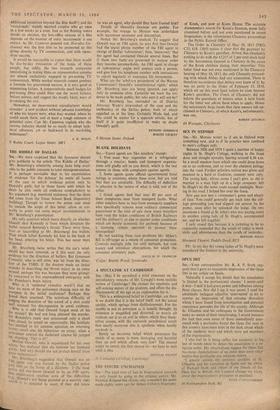THE RIDDLE OF DALLAS
SIR.—We were surprised that the Spectator should give publicity to the article 'The Riddle of Dallas' Mr. Brienberg's selectivity among facts long avail- able to the public amounts to total misrepresentation. It is perhaps inevitable that in his examination of evidence 'for the defence' he omits all facets of the case in which evidence points only to Oswald's guilt; but in those facets with which he deals he also omits all evidence contradictory to his argument (e.g. manifold testimony that the shots did come from the Texas School Book Depository building). Though to review the entire case must lie outside the scope of this letter, allow us cur- sorily to point out some major inconsistencies in Mr. Brienberg's presentation.
His only question which bears directly on whether Oswald shot Kennedy is from which direction the bullet entered Kennedy's throat. There were three, four or (according to Mr. Brienberg) five bullets. That which killed Kennedy hit him in the back of his head, entering his brain. This has never been disputed.
Mr. Brienberg twice writes that the car's wind- shield has been removed, as if this were the only evidence for the direction of bullets. But Governor Connally, who is still alive, was hit from the direc- tion of the TSBD. If the doctors made an initial mistake in describing the throat injury as an entry Wound, perhaps this was because they were primar- ily concerned in this unprecedented emergency with the President's brain injury. Why is it 'ominous' (emotive word!) that we hear no more of the policemen chasing men on the overpass in the initial confusion? Perhaps they found them unarmed. The notorious difficulty of judging the direction of the sound of a shot could well account for discrepancies in aural evidence. Why is it odd that Oswald forgot most of his his money? He had not long planned the murder, for Kennedy's route was announced only a short time ahead; he seized an opportunity. His landlady has testified to his extreme agitation on returning home; recall also his behaviour on arrest; when a Policeman entered the darkened cinema he jumped UP, shouting, 'This is it!' Marina Oswald, who is sequestered for her own safety, has declared that she believes her husband guillY. And why should she not protect herself from press molestation?
Brienberg's suggestion that Oswald was an
F 1 agent and was framed by the Dallas police puts him on the horns of a dilemma: if the local Police did not know Oswald to be an FBI agent, tehis explanation resolves none of the difficulties
Oswald's not being guarded as a security risk) which it is designed to meet; if they did know he was an agent, why should they have framed him? Details of Oswald's finances are public. For example, his voyage to Mexico was undertaken with maximum economy and discomfort.
Notice Mr. Brienberg's method. To suggest that Oswald was an FBI agent, he says first that Oswald had the secret phone number of the FBI agent in charge of Dallas 'subversives'; then, 'moreover,' that the agent had contacted Oswald several times. But if these two facts' are presented in reverse order they become unremarkable. An FBI agent in charge of 'subversives' might well contact such a person, and give him his telephone number with instructions to report regularly or announce his movements.
What are the 'arbitrary procedures' of the Warren Commission? Oswald's 'constitutional rights,' which Mr. Brienberg says are being ignored, can apply only to someone alive. Certainly we want the evi- dence to be made public, but who says it will not be?
Mr. Brienberg has reminded us of District Attorney Wade's misconduct of the case and the inefficiency of the Dallas police, both of which appalled us at the time. Certainly Wade lied, and this could be matter for a separate article; but of itself it is quite insufficient to make us doubt Oswald's guilt.
8 Merton Street, Oxford RICHARD GOMBRICH MARTIN GILBERT


































 Previous page
Previous page